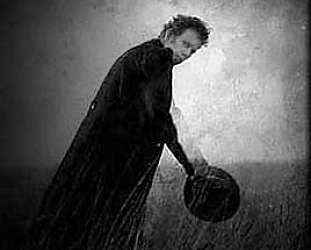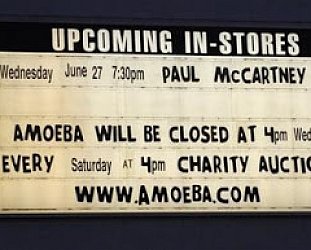Graham Reid | | 1 min read
Tom Waits: Earth Died Screaming

In the early Nineties Jerry Garcia of the Grateful Dead observed that Bob Dylan still wrote the most beautiful tunes . . . didn't always sing 'em of course, but the melody was in there somewhere.
With Bone Machine -- Waits' best album since Rain Dogs in '85 and clear contender for album of the year in '92 -- Waits penned a bracket of melancholy, beautiful ballads which recalled his best material of a decade previous.
On Who Are You, A Little Rain, Dirt in the Ground and the terrifying poolhall soundtrack That Feel (with fellow bitumen-voiced balladeer Keith Richards), the melodies lie limpid in songs where the instrumentation is distilled down to an odd array of percussion, distorted guitar, Ralph Carney's emphysemic sax and the typically Waitsean piano.
Pulled off the shelves for consideration in this on-going series of considerations, we can hear there are beautiful tunes in there somewhere, it's just that Tom doesn't always sing them.
And that's the beauty.
The open "jazz" instrumentation (and it is jazz from Purgatory) allows Waits to unleash the many voices he now has.
On Jesus Gonna Be Here he's a well-soaked back-porch philosopher; on All Stripped Down he's a Robert Johnson over rattlesnake percussion; Black Wings is a distorted spaghetti western theme as conceived by Bergman on a downer; and there's the grim ruralism of the Murder in the Red Barn ("there's always some killin' you got to do around the farm" he wheezes with unnerving menace).
And The Ocean Doesn't Want Me is an elegantly wasted, submerged spoken-word suicide note.
It is weird, hyppnotic and skeleton-rattling music made even more appealing by a production job which makes it sound as if Waits is variously in a cage made of bones and branches, down a hole or -- in the case of the inarticulate yelps on the short Let Me Get Up On It -- in a room with the thumbscrews and the rack turning.
Death flaps its wings over most things here. Death and delusion. (Going Out West about making it in Hollywood, "gonna change my name to Hannibal, or maybe just Rex").
Dark, humorous and disturbing stuff.
With Bone Machine -- an appropriate title given the music's bizarre, ritualistic, rattling and percussive nature -- Waits placed himself firmly in that corner usually only occupied by the likes of Captain Beefheart.
But where Beefheart jumped in deep in the Sixties on an album like Trout Mask Replica, Waits has taken his audience with him from bar to noir to the engrossing trash-can atmospheres of Bone Machine.
It has been a long and rewarding journey.
Others, like the street poet Moondog and Harry Partch, have passed this way too, but Tom Waits brings his own creaky, gritty and unique vision.
Eccentric, yes. But also essential.
.
Albums considered in this on-going page of essays are pulled from the shelves at random, so we can get the good, the bad or the indifferent from major artists to cult acts and sometimes perverse oddities.







post a comment